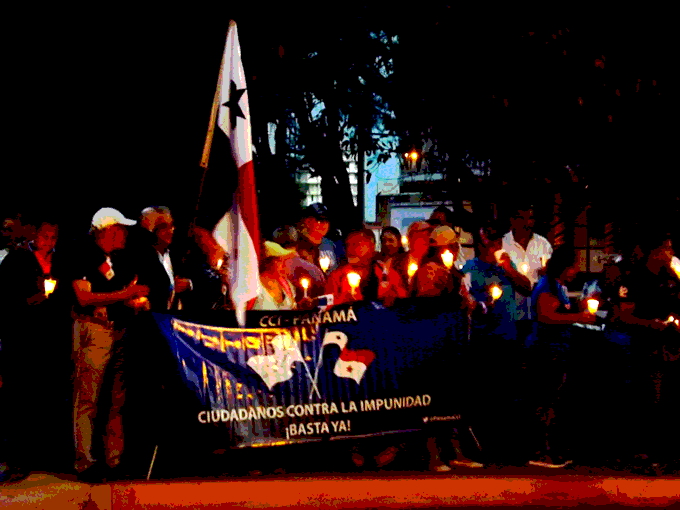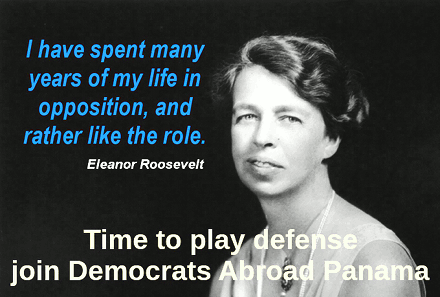
President Varela accused: Odebrecht and
Panama Papers scandals merge and explode
by Eric Jackson
As the sun was setting on February 8, a pair of buzzards on a nearby rooftop looked on as some of there featherless peers were gathered in Parque Porras, protecting across from the attorney general’s office. Few in the small crowd were under 40, and despite the bullhorns and the occasional chants a sense of quiet desperation prevailed. Were the same crooks as always going to get away with crimes they clearly committed, with Panamanian society walking right by after the most cursory of glances? Were public officials’ declarations that there is a list of politicians who took money from the Brazilian criminal combine Odebrecht but that the list must remain secret to protect Odebrecht’s privacy going to stick? Would all of the declarations by foreign governments about Odebrecht crimes in and through Panama, with well connected Panamanian accomplices, going to be officially ignored? What could be done by such a small band of dissidents to keep up the pressure?
The following day Attorney General Kenia Porcell’s minions moved into action, citing evidence provided by authorities in Brazil, Peru, Ecuador, Colombia, the United States and Switzerland. Once again they raided the Panama City offices of Mossack Fonseca — this time neither to discover and punish the source of the Panama Papers leaks nor to stop the shredding of documents, but in search of corroboration of some specific information. The law firm’s founding partners, Jüergen Mossack and Ramón Fonseca Mora, were taken in for questioning. On his way into the Avesa building on Via España to answer prosecutors’ questions an enraged Fonseca — this time last year minister without portfolio and right-hand man in President Juan Carlos Varela’s cabinet and VP and effective day-to-day leader of the president’s Panameñista Party — lashed out.
The allegation here was not “The Panama Papers” per se, but that the Mossack Fonseca law firm had helped the Brazilian company Odebrecht launder bribe money for officials of several countries through Panama and through a number of other jurisdictions. The claim that companies incorporated by Mossack Fonseca had been used as shells in corruption within Brazil had been out there for a long time. But over the previous few days former Peruvian President Alejandro Toledo and current Colombian President Juan Manuel Santos had been accused of taking money from Odebrecht through companies or money laundering networks set up by Mossack Fonseca.
“Mossack Fonseca has no relationship with Odebrecht, nor with any other Lava Jato company,” Fonseca told reporters. (Lava Jato, “car wash” in Brazilian Portuguese, is the name of the Brazilian police investigation of corrupt dealings by the Petrobras state-owned oil company, the Odebrecht group of companies built around one of the world’s largest construction firms, and the Braskem chemical company that’s a partnership between Petrobras and Odebrecht. The scandal has shaken Brazilian politics to its core and is nowhere close to over there.) “They’re looking for a scapegoat, for someone to distract attention,” Fonseca said of the prosecutors.
Distract attention from what? Fonseca accused the president and a pair of Panameñista legislators of meeting with the president Supreme Court magistrate, José Ayú Prado, to arrange for the latter to coordinate his decisions with President Varela’s actions. He dropped an even bigger bombshell:
President Varela told me — may lightning strike me if I lie — that he had accepted donations from Odebrecht because he couldn’t fight everyone.
The president’s supporters predictably dismissed the statement as a convenient lie by a man in trouble and seeking to divert attention, some pointing to the hearsay nature of Fonseca’s allegation. National Assembly president Rubén De León, a member of the PRD whose caucus seems to be in disarray about the claims, summed up the traditional response of Panama’s political caste: “Whoever accuses must produce sufficient proofs to demonstrate that the declarations are made with certainty.”
The operating presumption in De León’s scheme is that only someone who is desperate or mad would accuse a president and that nobody would second the allegation. But it may be that no other Panamanian need come forward to back up Fonseca’s story. There may be witness testimony from within Odebrecht, and documentary evidence in prosecution hands, to corroborate what Fonseca said.
Law professor Miguel Antonio Bernal, the principal organizer of the vigil in Parque Porras, opined that “the confessions of Fonseca Mora corroborate what is known.” Independent legislator and former attorney general Ana Matilde Gómez pointed out that while Fonseca’s statement isn’t sufficient to bring charges against Varela in the legislature, the current attorney general’s move against Mossack Fonseca was not some whim carried out without a foundation of information and investigation. Although she noted that the statement was made via the media and not under oath in a judicial proceeding, Gómez warned that Foncesca’s word could not be discounted because he was an insider in Varela’s political operation. “This is something that has to be verified,” she concluded.
Because it was Fonseca alleging what he said that Varela told him, wouldn’t this be hearsay? Indeed. In the Common Law system that prevails in the USA, hearsay is generally not permitted into evidence. However, if Varela said what he said, that would be an admission against penal interest and an exception to the ban on hearsay would apply. In Civil Code jurisdictions like Panama, the strict ban on hearsay isn’t in effect but such evidence is generally considered unconvincing unless corroborated by extrinsic proofs.
After a full day of questioning, prosecutors ordered Fonseca, Mossack and a third lawyer at their firm jailed pending further interrogation.
Meanwhile President Varela and his current inner circle — like Ramón Fonseca Mora — were issuing stern denials. The president said that he had never taken money from Odebrecht, and within less than a day had authorized the Electoral Tribunal to release his list of campaign donors. But from proceedings in other countries we know that Odebrecht usually paid off politicians, either as outright bribes or in the form of campaign contributions, via intermediaries that couldn’t readily be identified with the Brazilian company. Such is one of the luxuries of Panamanian corporate secrecy.
And what about Fonseca’s denial? He qualified his distancing from the Lava Jato shell companies, some of which his law firm did create. “The law doesn’t require you to know the final destination of companies, as is being asserted now,” he complained. Just because Mossack Fonseca created a shell company doesn’t mean that it will never be transferred without the law firm’s knowledge or control, the argument goes. But in the world of “off the shelf” shell companies, the law firm creators often know, and will sometimes advise, one or more transfers of a given company — whether for real or just on paper — in order to throw any investigator off if its tracks.
The case for which Mossack and Fonseca are being held is not about Odebrecht bribing Panamanian public officials. It’s about the firm setting up shells to hide bribery in other jurisdictions, offenses under Panama’s money laundering laws. One reason that bribery of Panamanians isn’t in the case is about constitutional jurisdiction. As to any sitting legislator, the Supreme Court is the only institution with jurisdiction to act. As to the president it’s only the National Assembly that has the power to investigate, prosecute and try. If the prosecutors of the Public Ministry find evidence of criminal wrongdoing by Varela or one or more legislators, they must stop the line of inquiry as to those officials and hand that part of their files over to the appropriate authorities.
The legislators have their own distractions. Pending before the Supreme Court is an appeals court ruling that absolved jailed ex-magistrate Alejandro Moncada Luna’s alleged money laundering accomplices on the theory that Moncada Luna’s plea bargain in his own case bars investigation or prosecution of accomplices who were not parties to that case for crimes that they may have committed. The legislature is considering Proposed Law 245, meant to encourage plea bargaining that would help clear up the monumental backlogs in this country’s criminal court dockets. But the appeals court ruling and the possibility that the high court will accept it means that Bill 245 could be used to have Odebrecht cop a plea to a criminal charge, with that deal then being used to bar any inquiry about legislators who took money from Odebrecht. In the face of a great public uproar, the legislators moved to amend the proposal. They added a provision that public officials convicted for corruption offenses could not avoid prison time by paying a fine. Which may be all well and good, but it doesn’t address the main concern about the proposed law.
To peruse the public record of every country in which Odebrecht’s criminal operations have been seriously investigated and in which the gist of what investigators have found have been revealed would lead to an expectation with respect to Panama. Most probably Odebrecht paid off most politicians of each major political party. If the hue and cry goes out to drive off the politicians who took Odebrecht money, that is almost surely the great majority of Panamanian legislators.
PRD party leader and legislator Pedro Miguel González implicitly acknowledges this problem and calls for and end to all corporate contributions to political campaigns. But his and the two other major parties in the legislature each lack a coherent and unified response to the unfolding scandal. The talk is becoming ominous.
From Cambio Democratico’s former security minister, José Raúl Mulino, himself the target of criminal investigations, the solution is to remove both President Varela and Attorney General Porcell. Veteran PRD campaigner Balbina Herrera talks about the possibility of a “technical coup.” Ana Matilde Gómez says that Porcell seems to be doing the right thing, doubts that as it now stands the legislature has what it would need to remove Varela, but thinks that the president may have lost so much support in the legislature that he may not be able to rule as a matter of political reality, regardless of the legal niceties.
Stay tuned. The ragtag little swarm of gadflies will be back in greater numbers. Other shoes are likely to drop. Panama is in institutional crisis mode and there seems to be no quiet and easy way out.
~ ~ ~
These announcements are interactive. Click on them for more information.










